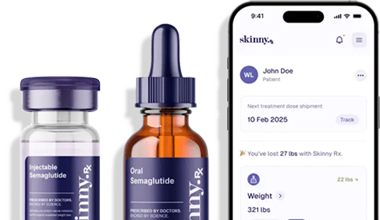
Key Takeaways
- Semaglutide mimics GLP-1 to slow digestion, reduce appetite, and support lasting fullness for weight management.
- Probiotics introduce beneficial bacteria that promote gut balance, digestion, and nutrient absorption while easing GI side effects.
- Combined use may enhance digestive comfort and help users maintain consistency with semaglutide treatment.
- Strains such as Lactobacillus, Bifidobacterium, and Saccharomyces boulardii are most researched for gut and GI symptom support.
- Adding prebiotics or synbiotics and following proper dosing and timing can further improve gut resilience and treatment tolerance.
You’ve probably heard of GLP-1 Agonists and probiotics, but you’ve probably never considered how the two can work in tandem. GLP-1s like semaglutide (brand names: Wegovy® and Ozempic®) curb people’s appetite by slowing the rate at which food moves through the digestive tract.
And the best probiotics for semaglutide users support your gut microbiome—an ecosystem of bacteria that reside in your stomach, influencing appetite, metabolism, and inflammation.
Semaglutide is a safe and effective way to help folks lose weight, but it has some side effects: nausea, diarrhea, constipation, and abdominal discomfort. Consuming probiotics can help alleviate them and support your overall gut health, allowing you to stay on track and remain productive in your day-to-day life.
In this article, we’ll cover everything you need to know about taking probiotics while on semaglutide.
Potential Benefits of Probiotics
Curious about how Wegovy and Ozempic affect gut microbiome changes? Research on probiotic supplements and the gut microbiome is still in its early stages; however, specific strains can complement weight loss and calm the side effects associated with taking semaglutide.
Complementing Weight Loss
The gut microbiome is constantly communicating with the rest of the body regarding weight, body fat percentage, and overall metabolic health. Research is mixed, but a 2025 systematic review reported that microbiome interventions (e.g., probiotics) generally improved body weight, body fat percentage, and metabolic parameters (e.g., lipid levels, glucose metabolism) in people with obesity.
Probiotics may complement your overall goal of weight loss and improved health. Plus, probiotics have a good safety profile with low risks.
Reducing GI Side Effects
GI side effects, such as nausea, diarrhea, and constipation, are common when taking semaglutide. Probiotics have a strong reputation for supporting gut health and reducing GI side effects (1).
However, the exact type of probiotic and dosage for a given condition are not entirely clear. Plus, everyone’s gut microbiome is different, similar to a set of fingerprints, and therefore, results may vary from one person to another.
Allow yourself about two weeks to judge how the supplements are affecting you, and be sure to keep your fluid and fiber intake at the recommended levels. If symptoms worsen or are accompanied by fever, dehydration, or abdominal pain, stop using them and contact your healthcare provider.
Enhancing Nutrient Absorption
A healthy gut microbiome plays a significant role not only in digestion but also in the absorption of nutrients from the foods you eat. The microbes in your gut produce enzymes that break down complex compounds in food, allowing them to be absorbed more efficiently by the body.
One meta-analysis found that probiotic supplements had a positive impact on specific micronutrients (vitamin B12, folate, calcium, zinc, and iron), but also said that more research is needed to determine the most effective strains and doses for efficacy.
Supporting Immune Function
A stronger, more diverse gut microbiome can help protect you against illness. (This doesn’t mean that probiotic supplements are an alternative to prescribed medicine and doctor-approved treatments.)
Think of your gut microbiome as a small, functioning city. The better the city's infrastructure (think plumbing, roads, and public transportation), the more efficient the population is. A healthy gut microbiome can better educate your immune cells, bolster your intestinal barrier, and reduce inflammation.
One 2023 review, published in the journal Cells, draws a link between microbes in the intestine and a healthy immune system. It concluded that while more clinical research is needed, the evidence suggests that when immune cells interact with consumed probiotics, there is an improvement in immune function.

The gut microbiome is truly the foundation of whole-body health. Probiotics are tiny allies that help diversify the ecosystem, improving everything from digestion and nutrient absorption to your overall immune defense.
–
Whitney Linsenmeyer, PhD, RD, Assistant Professor of Nutrition and Dietetics
The Science Behind Probiotics and GLP-1s
Semaglutide mimics the naturally occurring hormone, glucagon-like peptide-1 (or GLP-1), which, in the simplest words, slows down how quickly food leaves your stomach. As a result, anyone taking it feels fuller for a longer period.
Naturally, your gut microbes ferment fiber into short-chain fatty acids (SCFAs). Those SCFAs nudge cells in your small intestine to release hormones like GLP-1 that tell your brain you’re full. Semaglutide targets these pathways through medication, and a well-balanced microbiome supports it.
So, can probiotics make semaglutide more effective? There’s no hard evidence. Probiotics aren’t a second weight-loss drug.
They influence body weight and body composition in different ways, while also making treatment easier to live with, as some strains can dial down nausea, diarrhea, or bloating. For example, Lactobacillus strains for GLP-1 side effects target comfort—less bloating or loose stools—so you can stay consistent with your semaglutide.
Fewer rough gut days mean it’s easier to keep your prescribed dose and daily routine. Trial one probiotic supplement at a time for two to four weeks; if nothing changes, switch.

Choosing the Right Probiotics
Probiotics vary in their formulation, or which bacterial strains are included; some of the most researched probiotics include Lactobacillus, Bifidobacterium, Bacillus, or Saccharomyces boulardii. Formulations also vary in their composition, typically expressed as the number of each strain, known as colon-forming units (CFU).
Choosing a probiotic is like picking a tool for a renovation: you want to match the tool to the job. We’ll get into that below, but here are some general guidelines to abide by when shopping for a probiotic supplement:
- Check the dosage: The dose is strain-specific, and the label should list a number of colony-forming units (CFUs) that are good through shelf life. Most supplements will contain between 1 and 10 billion CFUs, with some going as high as 50 billion.
- It provides the benefit you want: Different strains elicit different benefits, so pick a product that has research-backed evidence supporting its intended use. Consult with your physician on which type of strain(s) will support your health goals.
- Safety first: If you’re pregnant, immunocompromised, have a central venous catheter, or have a complex GI disease, consult your clinician before starting.
- Check the label: The label should specify the genus, species, and strain, CFU number, serving size, storage instructions, and company contact info.
Bottom line: pick the right strain, at a reliable dose, in a format you’ll actually take every day.
Refrigerated Vs. Shelf-Stable Probiotics
Some probiotics require refrigeration to keep the healthy microbes alive and thriving. Shelf-stable capsules are far less finicky, holding up to room temperature conditions far better than their chilly counterparts.
But the potency of either type of probiotic depends more on the strain than on where they’re stored. Look for the exact strain, a guaranteed CFU count throughout the entire shelf life, and clear storage instructions. Pick the format you’ll actually take every day. Both can work—consistency wins.
Best Strains for Semaglutide Users
Common probiotic formulations include Bifidobacterium, Saccharaomyces, Streptococcus, Enterococcus, Escherichia, and Bacillus. Always consult with your doctor before taking a new supplement, especially if you’re on other medications, like semaglutide, and have side effects.
Note: Currently, one ongoing clinical trial is investigating the effects of probiotics on users of semaglutide. Otherwise, there are no published clinical trials directly testing the use of probiotics in individuals using semaglutide. The evidence we do have, much of which is linked throughout this article, suggests that GLP-1 drugs alter the gut microbiome and that different strains can benefit GI symptoms.
Prebiotics & Synbiotics
In addition to probiotics, prebiotics and synbiotics can support gut health. Prebiotics are fermentable fibers that feed your gut microbes and can help boost the benefits of a probiotic. Foods such as bananas, onions, and asparagus are naturally high in prebiotic fibers. Prebiotic supplements and foods fortified with prebiotic fibers are also available.
If you are new to taking a prebiotic, your gut needs time to adapt gradually. Start by taking a low dose for a few weeks, and then gradually increase it while maintaining a high fluid intake. If any of your side effects from semaglutide worsen, consider taking a lower dose or stopping the supplement altogether.
Synbiotics, a combination of prebiotics and probiotics, can further support gut health and weight loss goals. However, the evidence is mixed. In one meta-analysis, probiotics and symbiotics reduced waist circumference, but not total body weight or BMI.
If you use a synbiotic, choose one that lists the exact probiotic strain and the type/amount of prebiotic, and reassess after three to four weeks.

Your Weight Loss Journey, Guided by Experts
Everyone’s weight loss journey is different. Learn whether semaglutide or tirzepatide could be a safe, effective option for you through a short medical assessment.
How to Take Probiotics with Semaglutide
First, take a step back and self-evaluate whether you even need to take probiotics with semaglutide. If you’re losing weight, feel healthy, and are experiencing minimal side effects, you probably don’t need them. However, if you think you’re a candidate—and we strongly suggest getting a professional opinion from a doctor and/or registered dietitian—there are a couple of things to consider.
As for when to take probiotics with Ozempic, there’s no need to space out your dose of probiotics with injectable semaglutide, as the two medications do not compete for absorption. However, oral semaglutide may impact the absorption of other oral medications. For better bacterial survival, take your probiotic with a meal. If you take critical oral medications, ask your clinician whether spacing from meals/probiotics is sensible.
How long for probiotics to work? Begin with the lowest effective dose of the specific strain and maintain it for 10 to 14 days before increasing your intake or switching to a different formulation. Follow the instructions provided with the respective supplements and maintain consistency with your timing and dosage.
Prebiotic and Probiotic Foods to Eat
You can also increase your probiotic (and prebiotic) intake by eating whole foods. That said, not all probiotic foods contain live cultures, so look for a product that contains live and active cultures.
Probiotic-Rich Foods
- Yogurt
- Kefir
- Sauerkraut
- Pickles
- Kombucha
- Kimchi
- Miso
- Fermented vegetables
- Tempeh
Prebiotic-Rich Foods
- Onions
- Leeks
- Asparagus
- Bananas
- Oats
- Apples
- Cocoa
- Flaxseeds
- Avocado
- Seaweed
Signs Probiotics Are Working
The best indicators that probiotics are working are more regular stools with a log-like consistency, fewer and/or shorter bouts of bloating, reduced nausea, and a better tolerance for semaglutide.
When to (Potentially) Avoid Probiotics
Don’t consider taking or stop taking probiotics if you are:
- Critically ill or immunocompromised. Although rare, there is a concern that probiotics may cause infection. If you are sick, then you should absolutely check with your doctor before taking any new supplement (including semaglutide, as well as probiotics and synbiotics).
- You have allergies. Always check the label of any supplement before taking it. It’s not uncommon for certain probiotic supplements to contain allergens such as dairy, egg, and soy.
- If your symptoms get worse. Stop taking probiotics and contact your physician if you notice a worsening of bloating, diarrhea, gas, or nausea. Contact your physician if you notice signs of infection, such as fever, fatigue, or body aches.
At SkinnyRx, we provide access to compounded GLP-1 medications like semaglutide and tirzepatide as part of a personalized weight loss plan. If you’re considering treatment, start with a quick online assessment to see if it’s right for you.


 Medically Reviewed
Medically Reviewed



